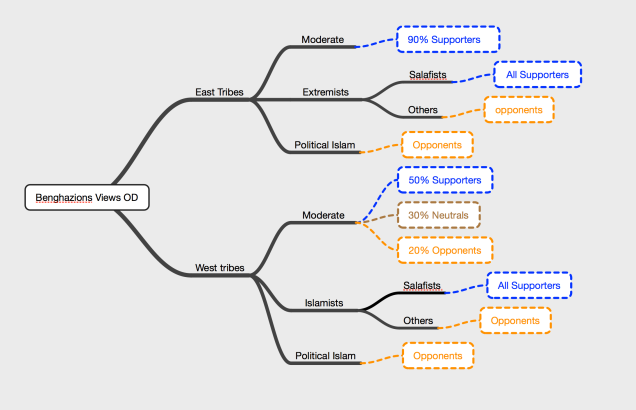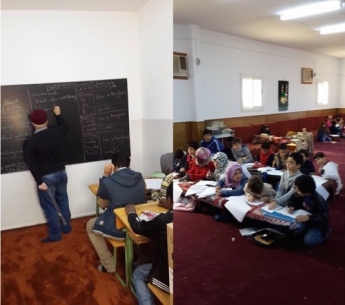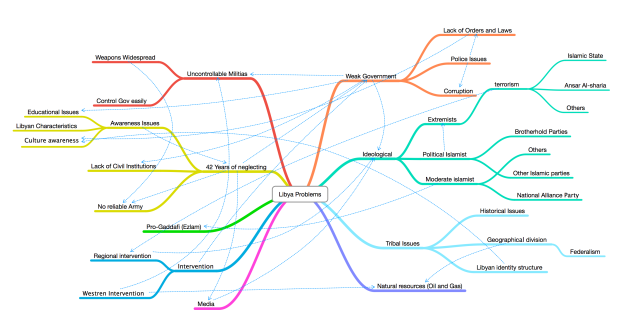This article describes only my own views. There are no tangible proofs that can support my observation. In other words,this article is based only on observational facts. It is not based on any research or statistics.
Life in Benghazi is socially enriched, everyday I meet strange people in different places. During the last five months, most of our chit chats are about the current conflict. I have observed different responses toward the Operation Dignity in real life or on social media. Not all Benghazi’s people have the same response, some are supporters, neutrals, or
adversaries. There is no statistics show exact supporters’ percentage. However, I can reassure that the majority is with Operation Dignity.
Five months period is enough to develop knowledge and make some observation on people’s views. It is easier now than ever to understand one’s opinion. People reaction fall in systematic way based on their tribes and their ideologies.
People of Benghazi come from the three provinces (Barga, Tripoli, and Fazzan) in Libya. One’s political opinion is directly related to their tribal roots. Even though most of them have settled here for many decades (Born and raised in Benghazi) and have no connection with their province, their opinion somehow connected back to their original tribe. This is what we call it “Jahawyia” or Regional, which is basically one stands only (either wrong or correct) with his tribe or province.
In this decoding, I focused only on people who come from Barga and Tripoli province as they represent the majority in Benghazi. I created two parts that are effecting people’s views. Let’s use XY as the unknown two parts. X represents the tribal roots or province. Y represents the ideology. Therefore, X is either from East (E) or from West (w ).
X= E or W
Most of Eastern tribes support Operation Dignity. As I said before there are no statistics showing the truth, but I can reassure that the majority of them is supporters. I never encountered one from Barga does not support Operation Dignity. If there is one who does not support, that would be related to Y parts, which is the ideology. let’s say (E) equals or larger than 90% supporters. West (w ), or people come from Tripoli province, has larger adversaries. One of my friends is rooted back to Misrata’s tribes. He has never visited Misrata before, and now he is one of opponents. It becomes on daily base obvious whenever I meet adversaries, I found out they are from (W ). Again, there are no statistics showing how many. In addition, (W ) holds the largest number of neutrals. Many people can’t see themselves related to any parts in this conflict. They keep saying the famous phrase (ربي ينصر الحق) “May God grant only victory to the right”. Let’s say (W ) equals or larger than 50% supporters, 30% neutrals, and the rest opponents.
Y part represents the part connected to the ideology, precisely islamic ideology. Let’s say ideology in Benghazi composes of three parts: Moderate, Political, and Extreme islam. Moderate muslims are the majority of Benghazi. I consider myself as moderate. My brothers, sisters, and friends are moderates. Still there are so many extremists, and we considered them as normal citizens before 2011 when ideological differences emerged. There are Salafists who proved to be against other extremists who joined Islamic State or Ansar Alsharia. The difference between Salafists and other extremists is Jihad. The third type is people who use Islam in their political advantages, famously known as Muslim Brotherhood. These people look no different than moderate unless you dig deep in their ideology, and they come from East and West as well.
Here we go again with their classification. Moderates (M) are mostly Operation Dignity supporters. Salafists extremist (ES) are all Operation Dignity supporters. Other extremists (E) with Muslim Brotherhood (MB) are all Operation Dignity opponents.Therefore (Y) represents the following
Y= (M), (Es), (E), or (MB)
Therefore, Benghazi’s residents attitude toward Operation Dignity is XY connected to each other.
For example, I come from Eastern tribes (E) and I am moderate. My attitude toward Operation Dignity when X= E and Y=M is EM which means I’m totally supporters according to the main equation XY.
Try yours, or try anyone you know. Just pick one and apply this equation. The chances you will get is so close to my results.
This is a diagram can help you understand my points
My whole point is that some Ideological divisions is not the only issue face Libya nowadays, but also divisions between the East and West. I could be wrong! Yes, but I believe if I have the full funds and the ability to launch a research with widespread survey in the city, I would be so close form these results. It’s only observations so far, and could be right or wrong. The only thing I need is the proof. Do you agree? let me know your code and how is related to the overall diagram.






